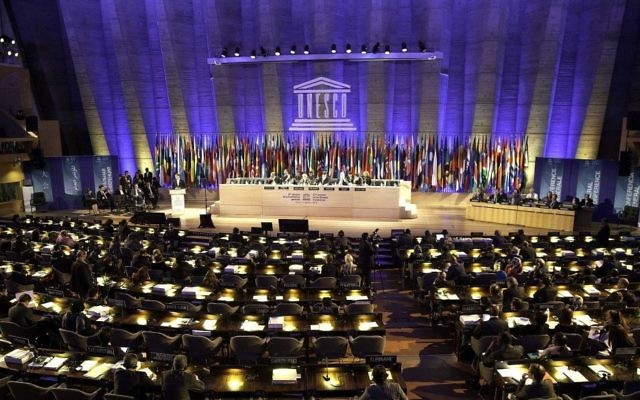Israeli-Arab diplomatic breakthrough at UNESCO was ‘like a wedding’
Diplomats at the United Nations have hailed a potential breakthrough on long-standing controversy
Diplomats at Unesco have hailed a possible breakthrough on long-standing Israeli-Arab tensions at the UN cultural agency.
Israel’s ambassador to Unesco said the mood was “like a wedding” after member nations signed off on a rare compromise resolution on “Occupied Palestine”.
The document is still quite critical of Israel, notably its actions in Jerusalem and Gaza, but Israeli ambassador Carmel Shama-Hacohen said diplomats agreed to move the most controversial language to a non-binding annex and avoided a contentious vote.
The compromise, worked out in months of painstaking negotiations, was largely technical, but it was an unusual example of Middle East co-operation at Unesco, which Israel has long seen as biased towards Arab nations – especially since it admitted Palestine as a member in 2011.
Other diplomats said they hope the compromise encourages the US and Israel to reconsider their decision to quit Unesco at the end of this year.
“It means that the spirit of dialogue is not broken,” Unesco director general Audrey Azoulay said. Since taking over in November, Ms Azoulay has been working to clean up the agency’s reputation and shore up a budget gutted by geopolitical disputes.
The relief and optimism at Unesco’s Paris headquarters were a far cry from the hostility that has for decades soured its discussions on Israel and the Palestinian territories, and hampered the agency’s efforts to protect cultural heritage or promote peace through school projects in the region.
The enthusiasm over what on the surface seems like a minor move is a reflection of the low expectations for Israeli-Palestinian co-operation in the current climate.
The Unesco negotiations notably hit trouble as deadly confrontations erupted in Gaza in recent weeks, said diplomats involved.
The Palestinian, Israeli, Jordanian, American and European Union delegations negotiated the compromise resolution with representatives of Unesco’s leadership.
They notably decided to limit the official “Occupied Palestine” resolution to three short paragraphs, and attach multiple pages of complaints about Israeli policies and Arab claims on Jerusalem in an annex, which is made public but not binding. Then they agreed to adopt it by consensus instead of a public vote.
“I’m more than happy,” the Israeli ambassador said. “Confrontation is not the way. Nothing will be changed in Jerusalem or in Gaza by forcing Israel into a corner.”
Mounir Anastas, the Palestinians’ alternate permanent delegate to Unesco, welcomed “so many efforts from all concerned parties and different delegations in order to enhance the dialogue and to reach a consensus”.
But he urged progress on the ground, notably allowing Unesco delegations to visit historic sites in Jerusalem, allowing Palestinian youth groups into Jerusalem for education programmes, and protection for media covering protests in Gaza.
The US delegation said it “warmly welcomes the progress demonstrated” and praised the “constructive spirit”, but would not comment on whether it could lead to a rethink of the pending US withdrawal.
The US stopped paying its Unesco dues after Palestine joined in 2011 but continues to participate in agency activities for now. President Donald Trump announced in October that the US would pull out at the end of 2018 because of perceived anti-Israel bias.
Israel followed suit. Asked whether prime minister Benjamin Netanyahu’s government could now reconsider, Mr Shama-Hacohen said: “It’s possible.”
“Unesco should be a bridge, especially in periods like we have now,” he said.
The resolution is expected to be approved at Unesco’s full plenary next week.

Thank you for helping to make Jewish News the leading source of news and opinion for the UK Jewish community. Today we're asking for your invaluable help to continue putting our community first in everything we do.
For as little as £5 a month you can help sustain the vital work we do in celebrating and standing up for Jewish life in Britain.
Jewish News holds our community together and keeps us connected. Like a synagogue, it’s where people turn to feel part of something bigger. It also proudly shows the rest of Britain the vibrancy and rich culture of modern Jewish life.
You can make a quick and easy one-off or monthly contribution of £5, £10, £20 or any other sum you’re comfortable with.
100% of your donation will help us continue celebrating our community, in all its dynamic diversity...
Engaging
Being a community platform means so much more than producing a newspaper and website. One of our proudest roles is media partnering with our invaluable charities to amplify the outstanding work they do to help us all.
Celebrating
There’s no shortage of oys in the world but Jewish News takes every opportunity to celebrate the joys too, through projects like Night of Heroes, 40 Under 40 and other compelling countdowns that make the community kvell with pride.
Pioneering
In the first collaboration between media outlets from different faiths, Jewish News worked with British Muslim TV and Church Times to produce a list of young activists leading the way on interfaith understanding.
Campaigning
Royal Mail issued a stamp honouring Holocaust hero Sir Nicholas Winton after a Jewish News campaign attracted more than 100,000 backers. Jewish Newsalso produces special editions of the paper highlighting pressing issues including mental health and Holocaust remembrance.
Easy access
In an age when news is readily accessible, Jewish News provides high-quality content free online and offline, removing any financial barriers to connecting people.
Voice of our community to wider society
The Jewish News team regularly appears on TV, radio and on the pages of the national press to comment on stories about the Jewish community. Easy access to the paper on the streets of London also means Jewish News provides an invaluable window into the community for the country at large.
We hope you agree all this is worth preserving.






















